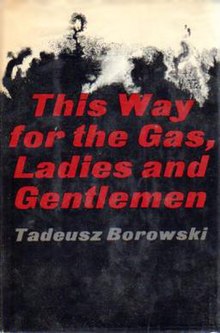This Way for the Gas Ladies and Gentlemen Read Online
 | |
| Author | Tadeusz Borowski |
|---|---|
| Original championship | Pożegnanie z Marią |
| Country | The states |
| Linguistic communication | English |
| Genre | Documentary |
| Publisher | Viking Penguin |
| Publication date | 1946 |
| Published in English | 1967 |
| Media type | Print (paperback) |
| Pages | 180 |
| ISBN | 0-14-018624-7 |
| OCLC | 2458688 |
| Dewey Decimal | 891.8/537 20 |
| LC Class | PG7158.B613 A28 1976 |
This Manner for the Gas, Ladies and Gentlemen, also known as Ladies and Gentlemen, to the Gas Sleeping room, is a collection of short stories past Tadeusz Borowski, which were inspired by the author's concentration camp experience. The original title in the Smooth language was Pożegnanie z Marią (Farewell to Maria).[ane] Following ii year imprisonment at Auschwitz, Borowski had been liberated from the Dachau concentration army camp in the spring of 1945, and went on to write his collection in the following years in Stalinist Poland.[2] The volume, translated in 1959, was featured in the Penguin'southward series "Writers from the Other Europe" from the 1970s.[3]
Overview [edit]
Borowski was arrested by the Gestapo in 1942. He was not a office of the Polish resistance motility in World State of war 2 against the Nazis in Warsaw, just his fiancée was. She was captured afterward falling into a trap set by the Nazis, and sent to a concentration army camp. When she did not return abode for the night, Borowski became worried, and started looking for her, only to end up falling in the aforementioned trap. He was caught and later on incarcerated at Auschwitz death camp for 2 years. He was sent on a decease march to the Dachau concentration camp ahead of the Soviet advance, and in the spring of 1945 liberated by the United states Seventh Army.[two]
Borowski was not Jewish, but was detained at Auschwitz and Dachau as a political prisoner. His views were therefore different from the postwar narrations of the Jewish concentration camp survivors. In a searing and shockingly satirical prose Borowski detailed what life-and-death felt like in the High german concentration camps,[4] including his revelations nigh the poisonous relationships between the prisoners themselves.[5]
The brusque stories in his collection are linked past the themes equally well as the presence of the main character Tadek, who serves the role of the narrator besides as the book's focal indicate. To a large degree the narrations are autobiographical. Tadek is a condensed version of Tadeusz and there is a high likelihood that Borowski wrote simply from his personal feel. However, the two personalities (the author, and the narrator) themselves are dissimilar. Tadek is a survivalist with a hard shell. Borowski, as described by his followers and people who knew him well, was a heart-centered leader and a man who nobly helped others and did non worry about himself.[v]
Literary structure of the collection [edit]
The book was featured in Penguin'south serial "Writers from the Other Europe" from the 1970s. Philip Roth was the full general editor, and the serial included authors such as Danilo Kiš, Bruno Schulz, Jiří Weil, and Milan Kundera, among others.[iii] The short stories contained in this volume include:
- "Pożegnanie z Marią" ("Farewell to Maria")
- "Dzień na Harmenzach" ("A Day in Harmenza")
- "Proszę państwa do gazu" ("This Way for the Gas, Ladies and Gentlemen")
- "Śmierć powstańca" ("Death of an Insurrectionist")
- "Bitwa pod Grunwaldem" ("Battle of Grunwald")
With the author'south permission, the volume was expanded to include further stories:
- "Chłopiec z Biblią" ("A Boy with a Bible")
- "U nas, westward Auschwitzu..." ("Amidst United states, in Auschwitz...")
- "Ludzie, którzy szli" ("The People Who Walked By")
- "Ojczyzna" ("The Motherland")
- "Ofensywa styczniowa" ("The January Offensive")
In the stories Borowski takes a "behavioral" approach – he only describes the behavior and outward reactions of the characters without delving into inner emotions and motivations, or specifying whatsoever kind of obvious moral sentence.
Borowski's piece of work attracted much attention, and his stories of the camps were highly acclaimed in Polish literary circles. Despite the deceptive simplicity of his style and his documentary technique, his writing carries a burden of meaning that far transcends the merely bodily. — Penguin Books [6]
See also [edit]
- Hanna Krall
- Zofia Nałkowska
- Smooth literature
Notes and references [edit]
- ^ Tadeusz Borowski, Barbara Vedder, This way for the gas, ladies and gentlemen, Penguin Classics at Google Books
- ^ a b Chris Ability (2011-08-25), "A brief survey of the short story part 35: Tadeusz Borowski Books, The Guardian.
- ^ a b Cooper, Alan (1996). Philip Roth and the Jews . State Academy of New York. pp. 163.
danilo kis writers from the other europe.
- ^ Karen Bernardo (2014), This Mode For The Gas by Tadeusz Borowski. Archived 2015-ten-30 at the Wayback Machine Summary & Analysis. Storybites.com.
- ^ a b Joanna Lenartowicz (2011/11/30), This Mode for the Gas, Ladies and Gentlemen - Tadeusz Borowski. Literature at Civilization.pl.
- ^ Penguin Books: This Style for the Gas, Ladies and Gentlemen. Overview.
Source: https://en.wikipedia.org/wiki/This_Way_for_the_Gas,_Ladies_and_Gentlemen
0 Response to "This Way for the Gas Ladies and Gentlemen Read Online"
Post a Comment